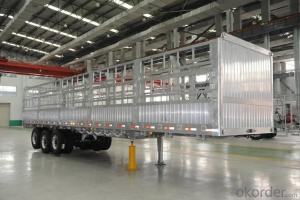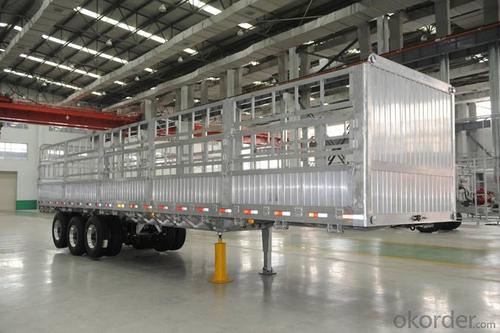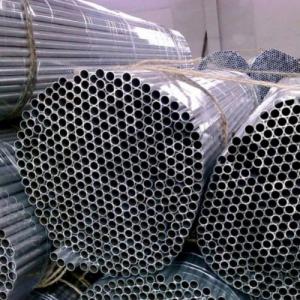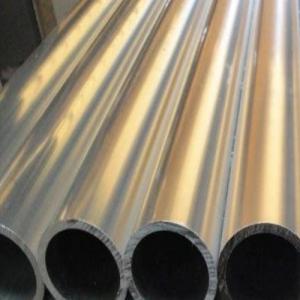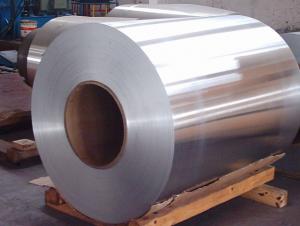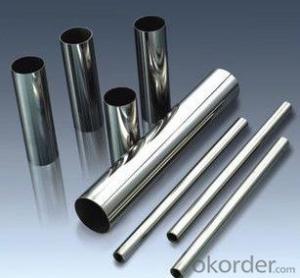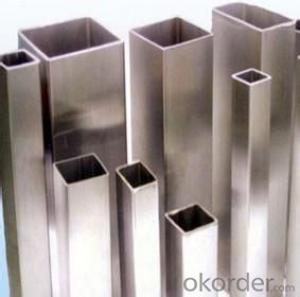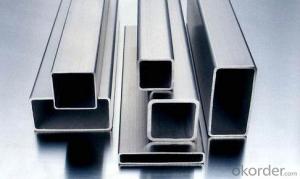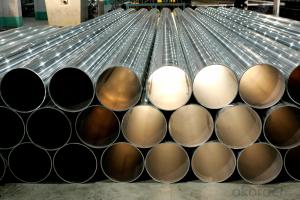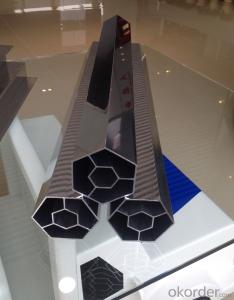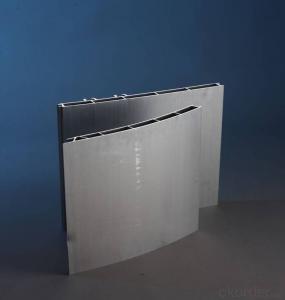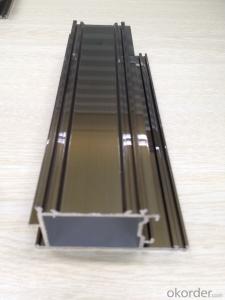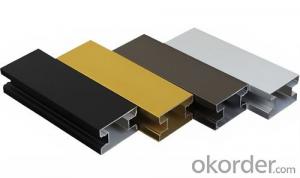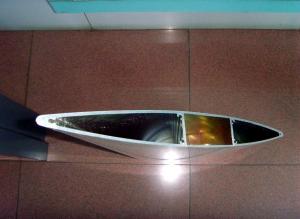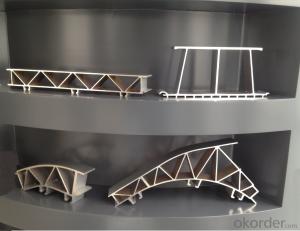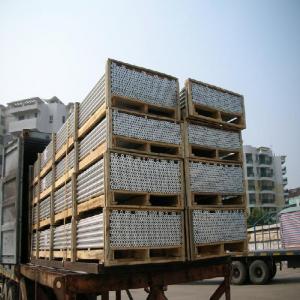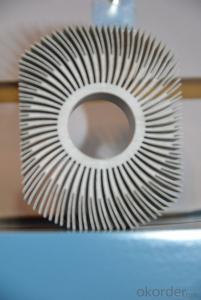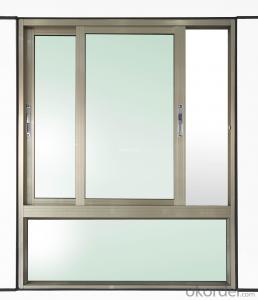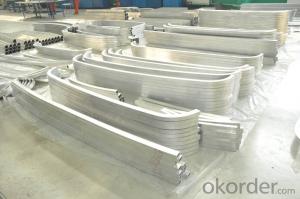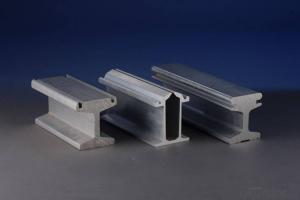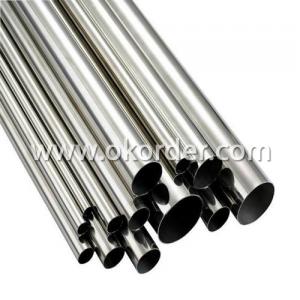Aluminum Pipes for Vehicle Frame Aluminum Profile
OKorder Service Pledge
OKorder Financial Service
You Might Also Like
We are the largest aluminum profilemanufacture in
Material | Alloy Aluminum 6063,6061,6005,6082 or customer nominated |
Temper | T3, T4, T5, T6 and other |
Surface | Anodize, electrophoresis, Mill,etc |
Colour | -- |
Length | Not more than 16 meters |
Good Package | Inner plastic film /outside carton/wooden pallets |
Payment Method | T/T, L/C, etc |
Delivery Time | Normally 2-4 weeks, Delivery time can be consulted. |
Press Machine | 500-12500 tons all together 93 press lines. |
Fabrication | 1. Car body; 2. Drilling; 3. Bending; 4. Cutting; 5. etc. |
Certificate | ISO/TS 16949,DNV,IRIS,CCS,AFA,etc. |
Dies | 1. Using our dies, no fee; |
2. Using customer drawing, opening dies, usually about 5~50 tons then the dies cost can be refunded. | |
3. Die cost is negotiable base on the order quantity | |
Capability | Annual output 800,000 tons |
- Q: How to distinguish between copper tube or aluminum pipe?
- Copper is yellow and aluminium is whiteIf it is copper plated, cut the tube and see the fracture to see whether it is copper plated
- Q: How do aluminum pipes handle vibration and shock loads?
- Aluminum pipes are known for their excellent ability to handle vibration and shock loads. This is primarily due to their inherent characteristics and properties. Aluminum is a lightweight and highly ductile metal, which means it has the ability to deform under stress without breaking. This flexibility allows aluminum pipes to absorb and dissipate vibrations and shocks, preventing them from being transmitted to other parts of the system. Additionally, aluminum has a high strength-to-weight ratio, making it a strong and durable material. This strength enables aluminum pipes to withstand high impact forces and sudden shocks without deforming or failing. The resilience of aluminum pipes makes them a suitable choice for applications where vibration and shock loads are expected, such as in automotive and aerospace industries. Moreover, aluminum has excellent corrosion resistance properties, making it suitable for use in various environments. Corrosion can weaken pipes and make them more susceptible to failure under vibration and shock loads. However, aluminum's resistance to corrosion ensures that the pipes remain structurally sound and capable of handling such loads over a prolonged period. In conclusion, aluminum pipes are well-equipped to handle vibration and shock loads due to their lightweight, ductile nature, high strength-to-weight ratio, and corrosion resistance properties. These qualities make aluminum pipes a reliable choice for applications where these loads are a concern, providing durability and longevity to the systems they are used in.
- Q: How to handle the surface of the aluminum tube is bright, and will not have any impression after touching it
- Can be anodized by bright aluminum to meet your requirements.
- Q: Are aluminum pipes suitable for automotive exhaust systems?
- Automotive exhaust systems can indeed utilize aluminum pipes. Aluminum, being both lightweight and durable, possesses numerous advantages for exhaust systems. To begin with, aluminum pipes exhibit resistance to corrosion, a critical characteristic for an automotive exhaust system exposed to heat, moisture, and various chemicals. This resistance to corrosion aids in extending the lifespan of the exhaust system and ensures its proper functionality over an extended period. Moreover, aluminum pipes possess exceptional heat dissipation properties. Thanks to aluminum's high thermal conductivity, it can rapidly dissipate the heat generated by exhaust gases, thereby preventing overheating and potential harm to other vehicle components. This becomes especially crucial in high-performance vehicles, where exhaust temperatures can rise significantly. Furthermore, aluminum pipes are relatively easy to manipulate and can be shaped and sized in various ways, making them versatile for different vehicle applications. Their lightweight nature also contributes to enhanced fuel efficiency and reduced overall vehicle weight, both of which can have a positive impact on performance. However, it is important to note that aluminum pipes may not be suitable for every automotive exhaust system. In situations where extreme temperatures or excessive vibrations are expected, alternative materials like stainless steel or titanium may be more appropriate. Nevertheless, for most standard to moderately high-performance vehicles, aluminum pipes represent a suitable and cost-effective choice for automotive exhaust systems.
- Q: Can aluminum pipes be used for conveyor systems?
- Conveyor systems can indeed utilize aluminum pipes. Aluminum, a material known for its lightweight and durability, is frequently employed in conveyor systems. Its utilization provides numerous benefits, including resistance to corrosion, a favorable strength-to-weight ratio, and ease of fabrication. Industries like food processing, packaging, and manufacturing often rely on aluminum pipes to function within their conveyor systems. These pipes can be effortlessly assembled, disassembled, and adjusted to meet specific layout demands. Furthermore, opting for aluminum pipes can be an economically sound decision due to their minimal maintenance requirements and prolonged lifespan.
- Q: How do aluminum pipes compare to PVC pipes?
- Aluminum pipes are generally stronger and more durable than PVC pipes, making them suitable for high-pressure applications. They also have better heat resistance and are not susceptible to UV damage. However, PVC pipes are more cost-effective, lightweight, and easier to install. The choice between the two depends on the specific requirements of the project.
- Q: Can aluminum pipes be used for water treatment plants?
- Yes, aluminum pipes can be used for water treatment plants. Aluminum is a widely used material for various applications, including water treatment plants. It has several advantageous properties that make it suitable for this purpose. Firstly, aluminum is corrosion-resistant, meaning it can withstand exposure to water and other chemicals commonly found in water treatment plants without deteriorating. This makes it a durable and long-lasting choice for piping systems, ensuring the integrity of the water treatment process. Secondly, aluminum pipes are lightweight, making them easier to transport, install, and maneuver within the water treatment facility. This can lead to cost savings in terms of labor and transportation. Furthermore, aluminum pipes have a smooth interior surface, which reduces friction and minimizes pressure drop within the system. This improves the overall efficiency of the water treatment process by maintaining a steady flow rate and reducing energy consumption. Lastly, aluminum is a sustainable and environmentally friendly material. It is 100% recyclable, meaning it can be reused or repurposed without losing its quality. This aligns with the growing trend of sustainability in water treatment plants. In conclusion, aluminum pipes can indeed be used for water treatment plants due to their corrosion resistance, lightweight nature, smooth interior surface, and sustainability. However, it is important to consider other factors such as the specific requirements and regulations of each water treatment plant before finalizing the choice of material.
- Q: What are the benefits of an aluminum tube cigar?
- Easy to carry, no need to buy cigars separatelyDon't smoke. You can take it backIt has certain anti-collision function
- Q: Can aluminum pipes be used for swimming pool systems?
- Yes, aluminum pipes can be used for swimming pool systems. Aluminum is a lightweight and corrosion-resistant material, making it a suitable choice for pool systems. It is commonly used for piping systems in both residential and commercial swimming pools. Aluminum pipes are known for their durability and longevity, as they can withstand harsh weather conditions and chemical exposure. Additionally, aluminum pipes have excellent heat conductivity, ensuring efficient heat transfer for heating or cooling systems in pools. Overall, aluminum pipes are a reliable and cost-effective option for swimming pool systems.
- Q: What are the insulation requirements for aluminum pipes in cold climates?
- Insulation is necessary for aluminum pipes in cold climates to prevent heat loss and ensure efficient system operation. The specific insulation needs for these pipes depend on factors such as temperature range, fluid type, and pipe use. A primary purpose of insulation for aluminum pipes in cold climates is to prevent condensation. When the pipe surface temperature drops below the dew point, air moisture can condense on the pipe, leading to corrosion and potential system integrity issues. Insulation helps maintain the surface temperature above the dew point, preventing condensation and protecting the pipes from damage. To minimize heat transfer and maintain the desired fluid temperature, the insulation material for aluminum pipes in cold climates should have a high thermal resistance or R-value. Common insulation materials used for this purpose include mineral wool, fiberglass, polyurethane foam, and cellular glass. These materials have excellent thermal insulation properties and can be applied in various forms, including pre-formed sections, blankets, or spray-on coatings. The thickness of the insulation layer depends on the desired thermal resistance and system requirements. It is important to consult local building codes and standards to ensure compliance with recommended insulation thickness for aluminum pipes in cold climates. Additionally, the insulation should be properly sealed and protected to prevent moisture ingress, which could reduce its insulating effectiveness. Along with thermal insulation, aluminum pipes in cold climates may require additional measures such as heat tracing or electric heating cables to maintain fluid temperature during significant drops in ambient temperature. These systems provide an additional layer of protection against freezing and ensure continuous system operation. In conclusion, the insulation requirements for aluminum pipes in cold climates involve selecting suitable insulation materials, determining the necessary thickness, and considering additional measures to maintain the desired temperature. Consulting experts or professionals in the field is crucial to ensure that the insulation meets specific system needs and complies with relevant regulations.
Send your message to us
Aluminum Pipes for Vehicle Frame Aluminum Profile
OKorder Service Pledge
OKorder Financial Service
Similar products
Hot products
Hot Searches
Related keywords
